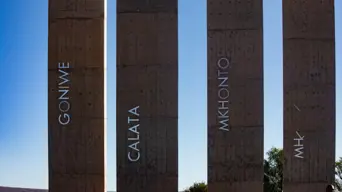'Cradock Four' inquest: Son of Calata drops bombshell that his dad died for his activism
The inquest is to establish whether the apartheid security branch police or any other people can be held liable for the deaths of the anti-apartheid activists.

The surnames of the Cradock Four on pillars at a memorial site in Nxuba. Picture: Kayleen Morgan/EWN
JOHANNESBURG - The son of slain apartheid activist Fort Calata has testified before an inquest that he was told by a senior government official that his father’s case was part of the price that had to be paid during negotiations for South Africa’s freedom.
The Cradock inquest is on its fifth day in the Gqeberha High Court, and Lukhanyo Calata is on the witness stand.
The inquiry is to establish whether the apartheid security branch police or any other people can be held liable for the deaths of the anti-apartheid activists.
Fort Calata, Matthew Goniwe, Sicelo Mhlauli and Sparrow Mkhonto were abducted and assassinated by police in 1985.
IN PICS: Gqeberha High Court Judge visits key locations linked to lives of ‘Cradock Four’
It’s a widespread rumour that the negotiators of South Africa’s freedom in the run-up to democracy may have agreed to certain conditions that have led to most black South Africans remaining disadvantaged, and the perpetrators of apartheid crimes being let off the hook.
But on Friday, in the “Cradock Four” inquest, the son of Calata, Lukhanyo, told the Gqeberha High Court of a conversation he had with the Deputy Minister of Justice, John Jeffrey, in 2017.
“The deputy minister said you know the issues of the TRC [Truth and Reconciliation Commission], including the ‘Cradock Four’ matter, was part of the price that had to be paid for the negotiation settlement. When he said that my blood was boiling, because what did he mean that this was part of the price that had to be paid?”
Calata said his family was not willing to accept that his father was used by politicians as a pawn in some kind of negotiation game.
ALSO READ: Judge visits locations related to killings of Cradock Four